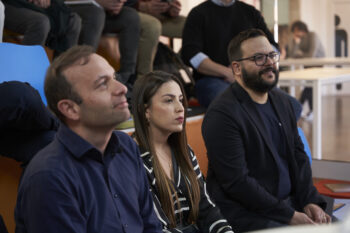We’ve all had those moments, walking out of conferences with a pocket full of business cards, we get in our cars or onto the train to go home and doubt for a split second if that whole afternoon just happened. Conferences are peculiar. Whether one wants to dress it up as a “Summit”, a “Forum”, or a “Colloquium”, these sorts of events present attendees and speakers with an interesting conundrum: why did you come here?
The word “conference” comes from the same root word as “confer”. Conferences are not only places of discussion, but occasions for learning and exchange of ideas. But, to dig a bit deeper, it also becomes clear that there’s a power dynamic: there are haves and have-nots. Someone must confer something to another.
I just spent the past week at two conferences. Each was different in format and audience demographic, radically so. But I nonetheless left feeling the same thing. I wrote in my notes, “I’m happy to have attended, but I don’t really know if I learned anything new.” One conference, the World Foresight Forum, hosted in Holland in The Hague, convened European and American leaders in business, government, and, to a lesser extent, the sciences to evaluate the problems facing our world today and provide a roadmap for our future. Last Sunday, this very jet-lagged FG correspondent went to TEDxUChicago, where assorted intelligent people delivered speeches about their Ideas worth spreading. It dawned on me, during day two of the World Foresight Forum, sometime after my third espresso but before my second glass of wine, that the type of people who really need to attend these events are the audience least represented.
I’ll explain what I mean by “type of people”. Two weeks ago, I helped organize an event with my friend and fellow student entrepreneur Ted Gonder at UChicago. Now, if there is any one student body in need of some entrepreneurial spirit, it’s U of C’s. Our goal was to bring a very diverse audience to the event; as unofficial marketing director, I kept our promotional material purposely expansive. I was sure not to mention entrepreneurship explicitly, figuring that doing so might alienate liberal-arts and hardcore math and science kids. Lo and behold, the overwhelming majority of attendees were already firm believers in entrepreneurship and its message. We were preaching to the choir. I’d have loved to see a whole phalanx of Goldman Sachs-bound economics majors attend; they might have changed their minds about investment banking. But that’s not the point.
That conferences rarely confer anything new is not a problem with me. Few are so deluded as to attend a conference in hopes of having their worldview changed. Leaders attend leadership conferences. Entrepreneurs talk startups at entrepreneurship conferences. The fact of the matter is, we go to conferences to be plunged into our comfort zones. We go to be with our people.
Economists and ecologists have a term for this sort of thing: assortative congregation. An old proverb explains it well. Birds of a feather flock together.










